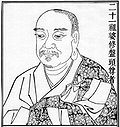 | Vasubandhu (traditional Chinese: 世親; ; pinyin: Shìqīn; Tibetan: དབྱིག་གཉེན་ Wylie: dbyig gnyen; fl. 4th to 5th century CE) was an influential Buddhist... 30 KB (3,484 words) - 21:58, 16 February 2024 |
on the Abhidharma written in Sanskrit by the Indian Buddhist scholar Vasubandhu in the 4th or 5th century CE. The Kośa summarizes the Sarvāstivādin Abhidharma... 18 KB (1,888 words) - 14:39, 5 April 2024 |
internally coherent Yogācāra school associated with Maitreya, Asaṅga, and Vasubandhu, however, uniquely – or "uncommonly" – also posits the existence of two... 51 KB (5,421 words) - 08:30, 16 December 2023 |
Idealism (section Vasubandhu) intersubjectivity, Vasubandhu appeals to shared karma as well as mind to mind causation. After answering these objections, Vasubandhu argues that idealism... 115 KB (14,922 words) - 07:49, 25 April 2024 |
Creator in Buddhism (section Vasubandhu) the universe. During the medieval period, Buddhist philosophers like Vasubandhu developed extensive refutations of creationism and Hindu theism. Because... 54 KB (7,374 words) - 11:12, 11 February 2024 |
Nimitta" (PDF). Retrieved February 8, 2024. Xuanzang; Vasubandhu (2018). Xuanzang; Vasubandhu; Vasubandhu (eds.). Three texts on consciousness only: Taishō... 4 KB (406 words) - 23:06, 22 February 2024 |
Sankrityayan. The Sanskrit version also included a commentary (bhāsya) by Vasubandhu. An important sub-commentary (tīkā) by Sthiramati also survives in Sanskrit... 4 KB (426 words) - 21:54, 23 April 2021 |


